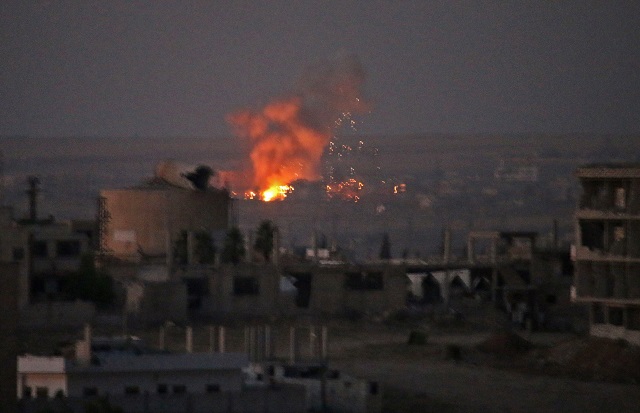
Moscow, a key ally of the Damascus regime, has been brokering talks for the negotiated surrender by rebels in areas of southern Syria bordering Jordan and the Israeli-occupied Golan Heights.
The negotiations collapsed on Wednesday, ushering in a day-long volley of air strikes, barrel bombs and missiles that ultimately pressured rebels to return to the table.
They resumed talks at around midday on Friday in the town of Busra al-Sham, freshly recaptured by government troops.
The negotiations lasted several hours without a final deal being announced, but a rebel spokesman said the broad contours had been agreed.
Hussein Abazeed said a ceasefire would take hold in Daraa province, which is known as the "cradle" of Syria's uprising that broke out in March 2011.
"Rebels will hand over their heavy-duty weapons in stages in exchange for the regime withdrawing from four towns" it has recaptured, said Abazeed.
Battered Syria militants to meet Russian brokers for new talks
Government forces would then take control of a key route running along the border with Jordan, up to the Nassib crossing.
"The Nassib crossing will come under a Syrian civil administration, with Russian supervision," he added.
Shortly after he spoke to AFP, Russian forces and civilian border officials from the Syrian government reached the crossing, said the Syrian Observatory for Human Rights.
State news agency SANA reported that the country's two-star flag was raised over the crossing.
Rebels captured the Nassib border point in April 2015, closing off one of the Syrian government's most vibrant trade routes.
With its recapture, the government in Damascus is hoping to reopen a crucial economic lifeline with neighbouring Jordan.
"The Assad government wants both Daraa city and the Nassib border crossing," said Nicholas Heras, an analyst at the Washington-based Center for a New American Security.
"Daraa is hugely symbolic for Assad because it is the cradle of the Syrian revolution, and Nassib allows the Assad government to get the Jordanians invested in a return of the regime in the southwest through the benefits to Jordan from reopened trade with Syria," Heras told AFP.
After securing areas around the capital this year, President Bashar al-Assad last month turned to the south, launching a bombing campaign on rebel areas on June 19.
Moscow, which intervened militarily in Syria in 2015, simultaneously began brokering talks, employing a carrot-and-stick strategy that has allowed the regime to recapture significant territory.
Under such deals, rebels hand over heavy weapons, local police take control of the area and government institutions resume working there.
More than 30 rebel towns have agreed to fall back under regime control through these agreements, more than doubling the government's hold on Daraa province to about 70 percent.
Regime forces had been moving quickly toward Nassib before the takeover was announced.
Their heavy bombing of surrounding towns, and the surrender of others, had already put regime troops within three kilometres (two miles) of the border, according to the Observatory.
Tense talks were still dragging on into Friday evening but had yet to produce an agreement on the fate of Daraa city or its western countryside, said rebel spokesman Abazeed.
He told AFP there was preliminary agreement on the safe transfer of at least 6,000 people, including rebels and civilians, to the northwestern province of Idlib.
According to rebel sources, Moscow had previously rejected a phased surrender of heavy arms and any population transfers.
Rebel territory in the south was included in a ceasefire brokered last year by Russia, the United States and Jordan, but that has done little to stem violence.
On Thursday, the UN Security Council convened an urgent closed-door meeting to discuss the south, but Russia blocked the council from adopting a statement.
More than 150 civilians have been killed since the start of the Daraa offensive, according to the Observatory.
The assault has pushed more than 320,000 people to flee, according to the United Nations, many to the closed border with Jordan or west near the Golan.
The Israeli army on Friday said it targeted a Syrian post on the northern Golan after forces there fired a shell that struck the buffer zone.







1732354127-0/Untitled-design-(3)1732354127-0-270x192.webp)


1732344836-0/BeFunk_§_]__-(37)1732344836-0.jpg)






COMMENTS
Comments are moderated and generally will be posted if they are on-topic and not abusive.
For more information, please see our Comments FAQ